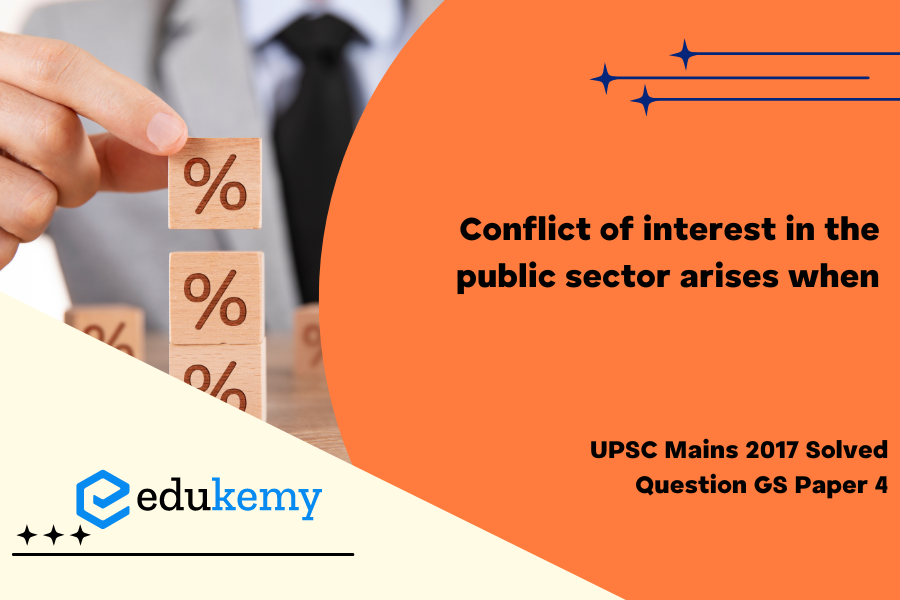Contents
Conflict of interest in the public sector arises when
- official duties,
- public interest, and
- personal interests are taking priority one above the other.
How can this conflict in administration be resolved? Describe with an example. (150 Words, 10 Marks)
Tag: Ethical concerns and dilemmas in government and private institutions.
Decoding the Question:
- In the Introduction, try to define conflict of interest.
- In Body,
- Explain instances when conflict of interest arises.
- Discuss the possible ways to deal with conflict of interest.
- In Conclusion, try to write a way forward.
Answer:
Conflict of Interest has shaken today’s world in the issue of governance and ethical practices. It refers to a situation in which a person while performing his official duties tries to derive personal benefits through his decision or actions. Usually this issue arises in public and political offices but in present day conditions due to more interactions between public and private enterprises, even private ones are not untouched.
Conflicts of interest often deteriorate standards of public services and governance. Corruption, nepotism, and lack of transparency in public and private sectors has led to the abuse of the official position by individuals for personal gain.
Nowadays, public institutions are seriously affected by conflict of interest. They may arise when:
- Official Duties: Conflict of interest arises when a person is required to fulfil two or more roles that may be in conflict with each other. This situation is sometimes known as ‘wearing two hats’. For example, a director may also hold a position as a public servant, or they may be a member of the board of another public entity or body.
- Public Interest: As a public servant, upholding public interest is not only in line with core values of public service but also adds to the integrity of individuals. Public interest may require an officer to work overtime and may take away the personal time he is required to spend with his family.
- When the public servant does not realise that it’s his/her duty to represent the government and public interest, it creates conflict of interest. Due to this, corruption may occur. To control conflict of interest in this concern, the government must make and implement anti-corruption laws.
- Personal Interest: When the public servant is overburdened with official work, he/she might not be able to fulfill the personal needs. Moreover, when the salary paid to them is less salary, less increment than expected. This certainly creates conflict of interest.

Public institutions affected by conflict of interest:
- Appointments: Appointment of personnel in public offices that are related to officials.
- Nepotism: Favoring relatives and friends over others, especially in terms of appointments, faster clearances of files, etc.
- Contracts: Awarding contracts to known persons in exchange for personal favors. Ex: Government contracts to politician’s son’s company or companies owned by his Benami.
- Policies formulations: Ministers or representatives involved in policy making in those areas where they have substantial interests. Ex: A person owning a tobacco manufacturing company takes part in policy-making related to tobacco consumption.
- Information: Leaking of information to other persons which might be of personal advantage to him later. Ex: An employee in a board meeting leaks information about new contracts to purchase more shares of the company for quick gains.
- Post-retirement: This can be observed in Judiciary, Given post-retirement jobs, favoring a party or person in verdicts. Ex: Verdict favoring a particular political party in view of future political appointments post-retirement.
Ways to deal with conflict of interest:
- Maintaining transparency-based governance will act as deterrence against abuse of power.
- Objectivity-based governance, will help one make impartial decisions and help establish integrity.
- Ensuring high standards of behavioral integrity.
- There is a need for legislation to make non-disclosure of conflict of interest punishable.
In today’s world of interconnectedness, where everybody is connected to every other thing, there will be conflicts of interest. But an individual must take the path of righteousness and function in a manner that is both moral and ethical. Also, transparency should be maintained for scrutiny to ensure accountability. We also need to move beyond treating conflict of interest as a mere moral issue and should also take into perspective the legal angle. The priority must be to frame a modern law relating to conflict of interest, along the lines of what exists in the statutes of the other countries like the United States.
In case you still have your doubts, contact us on 9811333901.
For UPSC Prelims Resources, Click here
For Daily Updates and Study Material:
Join our Telegram Channel – Edukemy for IAS
- 1. Learn through Videos – here
- 2. Be Exam Ready by Practicing Daily MCQs – here
- 3. Daily Newsletter – Get all your Current Affairs Covered – here
- 4. Mains Answer Writing Practice – here


